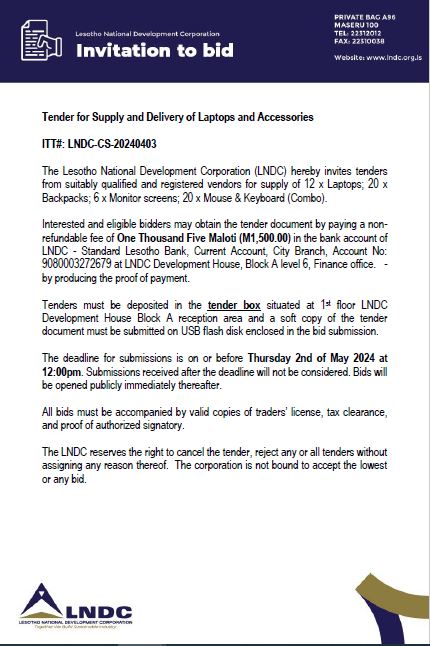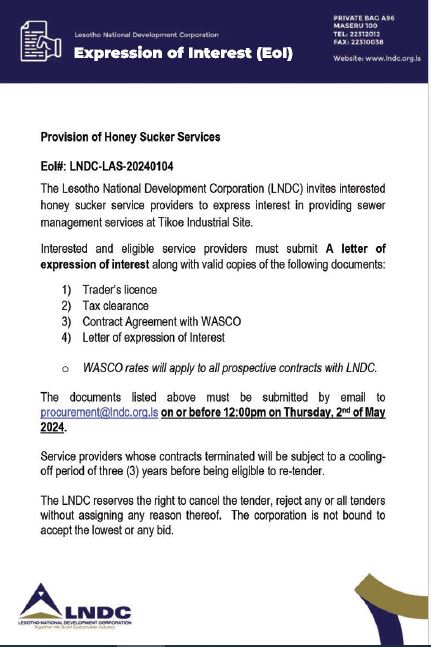Mohloai Mpesi
Lesotho is set to face a severe poverty should the German company, Frazer Solar become victorious in the legal battle against the government.
The drawn-out civil skirmish between the Germany solar company and the government of Lesotho is likely to threaten food security in the country according to the Prime Minister, Moeketsi Majoro’s affidavit in the High Court.
Majoro indicated that should the court give verdict on behalf of the foreign company, Lesotho is not only going to face the vast poverty but will also be crippled in its education and health structures and taste sour consequences as the country will be barred from accessing international loans and grants.
Lesotho was found in the fault by the High Court of the Republic of South Africa earlier this year after failing to respond to litigations filed by the German company where the company was awarded an arbitration price of €50 million besides an enforcement of assets seizure or revenue with the Trans-Caledon Tunnel Authority, which is an entity authorised by the Republic of South Africa to pay Lesotho’s royalties, Lesotho Electricity Company accounts with South Africa’s power utility, Eskom, Lesotho’s shareholding in WIOCC—the West Indian Ocean Undersea Cable Company headquartered in Mauritius, and the Lesotho Highlands Water Project accounts held in South Africa pursuant to that award.
This follows the Supply Agreement of Solar Panels which was allegedly inked by the former Minister in the Prime Minister’s Officer Temeki TÅ¡olo back in September 27, 2018 which Majoro deemed “unlawfulâ€.
This would experience Lesotho losing a lucrative sum of M855 510 900 if Frazer wins the case that has been staged before the High Court last Friday.
The Attorney General advocate Rapelang Motsieloa is the applicant in the matter, while Frazer GMBH, Frazer Solar (Pty) Ltd and Prime Minister in the Kingdom of Lesotho are first to last respondents respectively.
Majoro explained how the already injured economy would be affected and leave the country without a penny, thus affecting the livelihood of the citizens. To support this, he consulted his trusted economist who analyzed the discrepancy that would likely affect the country.
“To demonstrate the extent of the crippling consequences, I asked Dr Emmanuel Maluke Letete (Dr Letete) who is my Economic Advisor to conduct an analysis of the economic impact of payment of the judgment debt upon the Kingdom. Dr Letete’s confirmatory affidavit in which he confirms the analysis below is attached.
“The obligations the Kingdom purportedly incurred as a result of the unlawful Supply Agreement have resulted in the arbitration award granted January 28, 2020, without the Kingdom defending the claims. The execution of the arbitration award of €50million (M855 510 900) would have catastrophic consequences for the Kingdom of Lesotho,†Majoro said.
“In doing so, Dr Letete drew data from the 2020/21 fiscal mid-term budget review presented to the Lesotho parliament on January 17, 2021 and the International Monetary Fund’s recent debt sustainability assessment of Lesotho,†he said.
He continued that the bleeding pockets of the country would see the country’s Gross Domestic Product (GDP) nose-diving and posing a significant challenge to the already threatened food insecurity, health and education.
According to the Vulnerability Assessment Committee presentation dated July 2021, Lesotho has significant challenges addressing food insecurity within its available resources. Estimating that numbers of persons suffering from food insecurity in the Kingdom was 679, 430 in 2016/17, 606 660 in 2017/18, 308, 980 in 2018/19, 108, 110 in 2019/20, 766, 000 in 2020/21 and 470, 000 in 2021/22.
“As a result, execution of the €50 million arbitration award (which is essentially an enforcement of the unlawful supply agreement) will result in further decline in infrastructure and closure of schools and hospitals, limited funds to purchase grains, vegetable seeds, feeds and fertilizers which amount to M850, 4 million for farming. The payment of the €50 million arbitration award is likely to result in food scarcity, starvation and ultimate deaths of Basotho citizens,†he said.
“As is confirmed by this analysis, the Covid-19 pandemic has exacerbated the poor condition of the Kingdom’s economy. During the 2020/21 fiscal year, the government revenues declined while expenditures remain constant. This has resulted in a budget deficit of approximately €60.3 million, representing 3% of the Kingdom’s GDP,†he said.
“From this, it is clear that the Kingdom’s indebtedness of €50 million to FSG as a result of the unlawful Supply Agreement constitutes an amount that is almost as much of the amount of the entire country’s current budget deficit,†he continued.
He went on to explain that should Lesotho be forced to pay the €50 million as a result of the unlawful supply agreement, the immediate and instant consequence will see the country doubling the current budget discrepancy, pushing it close to 6% of its GDP.
“For example, the Kingdom received a loan from the IMF in United States Dollar (USD) equivalent of €40.3 million as an emergency support loan to reduce the fiscal effects of the pandemic. Allowing the Kingdom to comply with the obligations that arose from the unlawful Supply Agreement by paying damages awarded to FSG would more than wipe out the benefits of this emergency support loan.
“The €50 million arbitration award exceeds the combined amount of the IMF and European Union loans used to finance the Kingdom’s 2022/21 fiscal budget deficit,†the Premier contends.
He continued that failure to set aside the unlawful Supply Agreement and permitting the Kingdom to pay damages that are a direct result of the conclusion of the unlawful supply agreement will have a severe impact on food security, health and education in Lesotho.
He said in terms of the 2020/21 budget, the Kingdom can only cover a small fraction of its required capital expenses for food security, health and education as the country solely hinges on international grants and loans.
“The Kingdom budgeted about €24 million for food security capital expenses and can only cover €1.7 million (7%) of this amount. For capital expenses related to health infrastructure in 2021, the Kingdom budget €33.1 million, of which only €5.6 million can be covered directly.
“The Kingdom is heavily dependent on donor grants and loans to cover the balance of respective capital budgets for food security, health and education.
“In a further example of illustrating the scale of the impact of the judgment debt on the Kingdom’s economy, the Kingdom is currently constructing the Maseru District Hospital, a modern hospital to provide the much-needed improved health service.
“The total cost of this construction, which will be completed in 2023, is the equivalent of €50 million, equivalent to the judgment debt to be covered by a grant from the government of the People’s Republic of China.
“In total, Lesotho can only afford to cover €10.2 million (14%) of its total capital budget for food security, health infrastructure and school facilities. The €50 million arbitration award directly found in the unlawful Supply Agreement is five times this amount and represents 71% of the total capital budget for food, health and education.
“Execution of the Kingdom’s indebtedness to FSG due to the unlawful supply agreement will have an enormous impact on the Kingdom’s ability to borrow money,†he said.
“To finance its critical transport, health and education structure needs, the Kingdom typically needs to borrow funds from domestic or international sources. Its debt sustainability analysis and credit risk assessment determine its ability to raise debt for such infrastructure projects.
“The indebtedness will be reported as the Kingdom’s public debt according to international public accounting standards, which will affect the Kingdom’s ability to borrow,†he continued.
He said the standard metric used to assess a country’s debt sustainability and credit risk is the ratio of its Public and Publicity Guaranteed (PPG) debt to its GDP. The recommended sustainable debt-to-GDP ratio threshold for countries in the Southern African Development Community (SADC) is 60%.
“At the end of January 2021, the Kingdom’s total PPG debt stood at LSL equivalent of €1.2 billion, representing 58.1% of its GDP. The €50 million judgment represents 2.2% of the Kingdom’s GDP. Hence, the enforcement of the Kingdom’s indebtedness to FSG will push the country’s debt-to-GDP ratio over the 60% recommended threshold, and the government may be deemed a high credit risk. This will significantly reduce the country’s ability to borrow funds for or guarantee needed infrastructure projects. The judgment debt will therefore undermine any efforts to address the developmental needs of Lesotho,†he said.
He stated that 60% of government employees’ salaries are going to be affected if the judgment imposes that the government pays Frazer Solar.
“If Lesotho is required to pay €50 million to FSG, it will have to find it somewhere, in an economy where €50 million is not easily found, and in exchange for zero value from FSG. If the Kingdom must find €50 million to pay FSG, that is €50 million that cannot be spent on salaries, schools and hospitals. Extracting €50 million the country’s purse will severely affect its ability to meet its other pressing financial needs.
“The 2021 annual budgetary expense for wages and salaries amounts to M6.412 million, the most significant expenses in the government’s annual budget. On average, this represents the sum of M533.3 million per month. If the government reallocates these funds to cover the judgment debts, all salaries of government employees will not be paid for one month and approximately 60% of all salaries for the next month will be unpaid,†he said.





